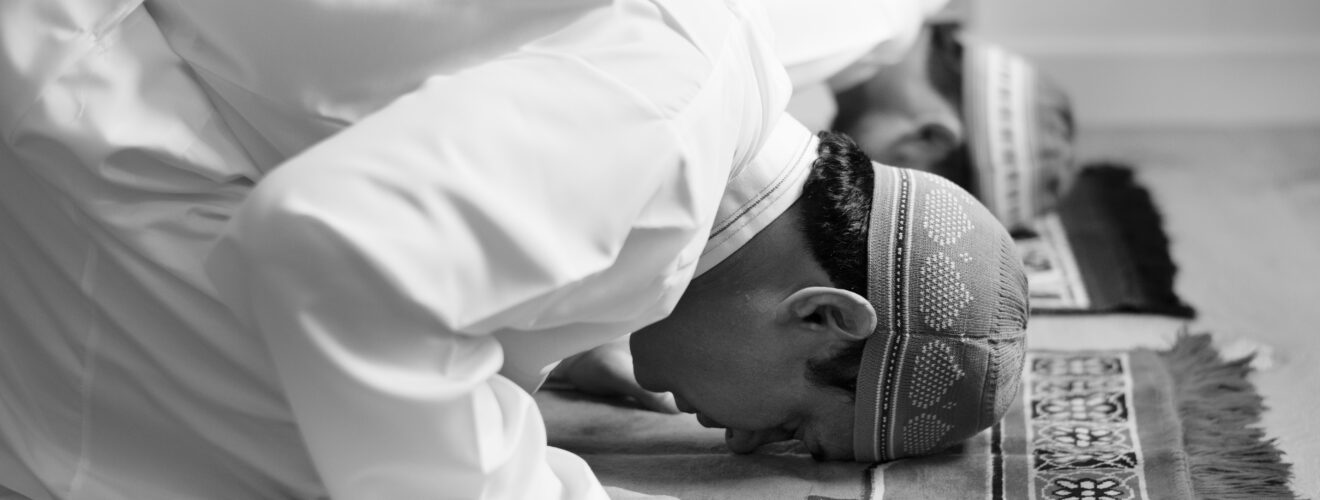Prostration of thankfulness

Getting your Trinity Audio player ready... |
In a world that is engulfed by evil it can often seem that good deeds are a rarity. But let not the evil of the oppressive think that they have purchase upon the final revelation sent to mankind. Indeed, even in the darkest of times, performing good deeds as prescribed are something to hold onto even more so.
To that end, we present a short-translation from al-Muḥalla by Ibn Ḥazm regarding voluntary prostration, sujūd, an act which is virtuous and rewardable. It should be noted here that the voluntary sujūd being spoken off is outside of the prescribed-prayers.
Issue 557: The prostration of thankfulness (or gratitude) – Sujūd al-Shukr, is ḥasan (good). When a blessing from Allah the Almighty comes to a person, it is recommended for him to perform a sujūd (prostration), because sujūd is a good deed.[1] Allah the Almighty has said:
وَافْعَلُوا الْخَيْرَ
And do good.[2]
No prohibition has been reported regarding it from the Prophet peace and blessings be upon him concerning it. Rather, what has been narrated (is as follows):
حدثنا عبد الله بن يوسف ثنا أحمد بن فتح ثنا عبد الوهاب بن عيسى ثنا أحمد بن محمد ثنا أحمد بن علي ثنا مسلم بن الحجاج ثنا زهير بن حرب ثنا الوليد بن مسلم سمعت الأوزاعي قال ثنا الوليد بن هشام المعيطي ثنا معدان بن أبي طلحة اليعمري قال لقيت ثوبان مولى رسول الله صلى الله عليه وسلم فقلت له أخبرني بعمل يدخلني الله به الجنة ، أو قلت ما أحب الأعمال إلى الله تعالى ؟ فقال سألت رسول الله صلى الله عليه وسلم كما سألتني فقال عليك بكثرة السجود لله تعالى ، فإنك لا تسجد لله سجدة إلا رفعك الله عز وجل بها درجة ، وحط عنك بها خطيئة قال معدان ثم لقيت أبا الدرداء فسألته ؟ فقال مثل ما قال لي ثوبان
Abdullah ibn Yusuf narrated it to us Aḥmad ibn Fatḥ narrated to us ‘Abd-al-Wahhāb ibn Esa narrated to us Aḥmad ibn Muḥammad narrated to us Ahmad ibn Ali narrated to us Muslim ibn al-Hajjāj narrated to us Zuhayr ibn Harb narrated to us al-Waleed ibn Muslim narrated to us – I heard al-Awzā’i say: al-Waleed ibn Hishām al-Mu’aytti narrated to me Ma’dān ibn Abi Talha al-Ya’mari narrated to me, he said: I met Thawbān, the freed slave of Allah’s Messenger peace and blessings be upon him and asked him to tell me about an act for which if I do it, Allah the Almighty will admit me to paradise, or I asked about the act which was loved most by Allah. He gave no reply. I again asked and he gave no reply. I asked him for the third time, and he said – I asked Allah’s Messenger peace and blessings be upon him about that and he said: ‘Make frequent sujūd before Allah the Almighty, for you will not make one sujūd without which Allah the Mighty and Sublime raises you a degree because of it, and removes a sin from you, because of it.’ Ma’dān then said that he met Abu al-Dardā’ and when he asked him (about it) he received a reply similar to that made by Thawbān.[3]
Abu Muḥammad (Ibn Ḥazm) said: al-Waleed ibn Hishām was among the prominent companions of Umar ibn ‘Abd al-Aziz, (renowned) given his good deeds and virtue. The remainder of the isnād is too well known (to be subject to) questions arising upon it. No one should be saying that this (matter of) sujūd is only related to the sujūd of the Salāh (prayer) specifically. Whoever were to claim such a thing, has spoken about the Messenger of Allah peace and blessings be upon him regarding that which he did not say. But rather in fact he has lied about him, by speaking about his intention (i.e. behind this narration) based upon ghayb (the unseen) and dthan (conjecture).

‘Allah will pay those who believe and do good deeds their reward in full; Allah does not love evildoers.’ [Qur’an: 3: 57]
Endnotes
[1] Ibn Ḥazm al-Muḥalla [Vol. 3, pp. 331/332 (Dar al-Kotob al-Ilmiyah, Beirut, 2010 ed)]
[2] Qur’ān, 22: 77. Only a small portion of the verse is cited, in full this reads as follows (Aḥmad Shākir translation): ‘O you who believe! Bow down and prostrate yourselves and serve your Lord, and do good that you may succeed.’
[3] The narration and channel are from Ṣaḥīḥ Muslim, in the chapter entitled ‘The virtue of Sujūd.’ As is customary with the aḥādith Ibn Ḥazm presents his isnād up to and including that of Imām Muslim (Muslim ibn al-Ḥajjāj).
[4] For an account regarding the events and battle see History of al-Ṭabari, The Conquest of Arabia [Vol. 10, (translated by Fred M. Donner, State University of New York Press, 1993)].
[5] From among the Khawārij, namely, ‘he with the woman’s breast.’ An account of his slaying by Ali is given in the History of al-Ṭabari [Vol. 17, pp. 133/134].


